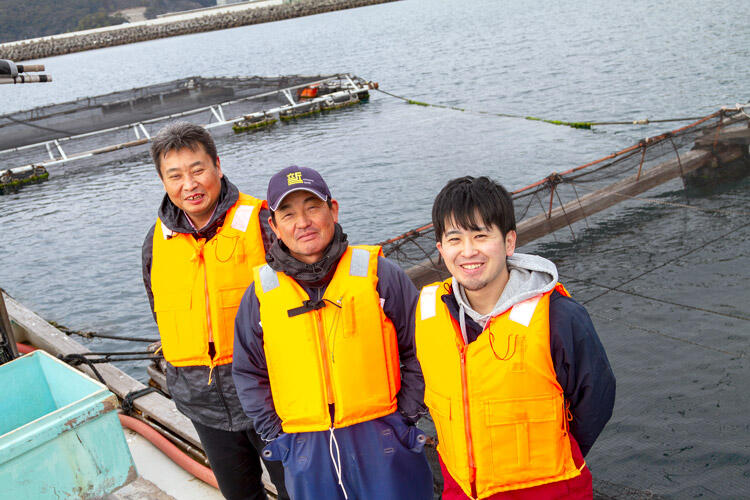
which is engaged in masu salmon (Oncorhynchus masou) aquaculture. A local fisherman stands in the center.
Regional resources and charms that have previously been overlooked are pioneering the future. Among these, cleverly thought-out ways of farming are being carried out in different regions, and this article focuses on a movement to create a new regional brand that is taking place in northern Miyazaki Prefecture. This movement is attempting to produce the rare masu salmon (Oncorhynchus masou), known as a phantom fish due to its scarcity, and the roe from which it hatches, through aquaculture. Smolt, Inc. (Miyazaki City, Miyazaki Prefecture) is a student venture company that originated in the University of Miyazaki. The company is involved in developing techniques for this project, as well as in production and sales, and won the STI for SDGs Award: JST President Award in FY2021. We asked Mr. Ken Ueno, Representative Director and CEO, and Professor Katsuhisa Uchida of the Faculty of Agriculture, University of Miyazaki, who is also a Director of Smolt, Inc., about the catalyst for engaging in this business, their techniques, which serve as the foundation for their highly praised cyclic aquaculture, the current situation and their hopes for the future.
They're actually the same species as yamame !
Yamame attract anglers as one of the most popular Japanese river fish. Their light-brownish bodies are around 20 cm in length, with speckles known as parr marks. On the other hand, masu salmon are large fish that can reach up to 70 cm. They are born in rivers and swim down to the sea, then swim back upstream to their river birthplace after they have grown larger to lay their eggs. At this point, their bodies become a rosy color, and so they are also known as cherry trout.
These two fish are very different in appearance and size, but they are actually the same species.

"Chum and masu salmon are initially freshwater fish, but they then head to the sea where food is plentiful, after making preparations so they can adapt to the highly saline environment. Finally, they return to the river where they were born and grew up to lay their eggs. Masu salmon are fish that have grown larger after going out to sea. The fish that stay in the river for their entire lives, rather than swimming to the sea, remain as yamame."
Professor Uchida, who gave us this explanation, has been focused on researching the seasonal migration and environmental adaptation of chum salmon since he was a graduate student, and so has a wealth of knowledgeable to share. As it happens, he was consulted by the Miyazaki Prefectural Fisheries Research Institute about yamame. That was the start of an initiative that aims to raise masu salmon in this area.
We want them to grow in the winter, too
In north-west Miyazaki Prefecture lies a small town called Gokase. It is located in a mountainous region, so the climate is cool. People raise yamame, which like cold water, here. However, the water temperature drops in the winter and the yamame barely eat anything, so they stop growing. "If you go to the coast, the water is the right temperature for yamame, even in winter. And so we talked about if we could raise them in seawater so they would also grow properly in the winter, and if we could return them to freshwater so would lay more eggs" (Professor Uchida).
The yamame raised in Gokase spend their whole lives without experiencing seawater. Therefore, the first point was whether the yamame could adapt to seawater. Professor Uchida's first aim was to establish a new aquaculture technique by gathering data on this.
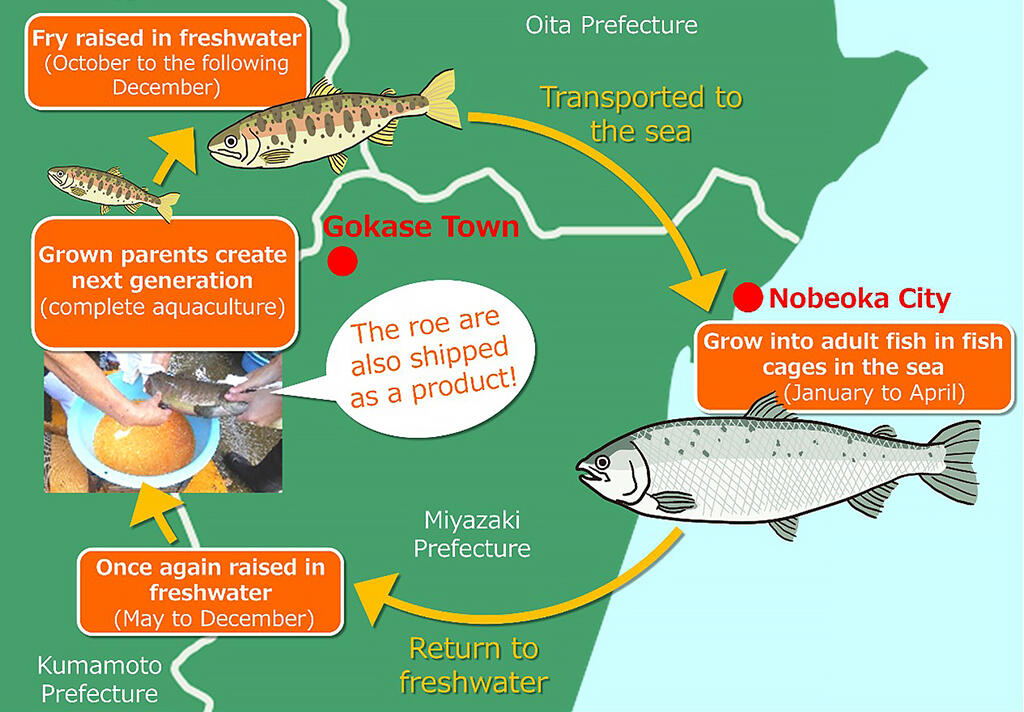
The bodies of yamame turn silver as they travel down to the sea. This phenomenon is known as 'smoltification.' When Professor Uchida investigated, many yamame in Gokase had not undergone smoltification, but the majority of the smolt were gradually familiarized with seawater and survived. When the smolt were taken to the coast of Nobeoka City and reared in fish cages in the sea for around four months, the yamame grew much larger and their body weight increased tenfold (maximum). Around May, the water temperature rises and it becomes difficult for the masu salmon to survive, so they are transported to Gokase and raised in freshwater until October, when it is time to lay their eggs. The eggs are then collected. If this cycle can be established, it could solve a regional issue.
Tackling issues through both the university and a company
Mr. Ueno joined Professor Uchida's laboratory in 2016. Mr. Ueno, who is from Kamaishi City in Iwate Prefecture, recalled, "I entered the University of Miyazaki because I wanted to study living creatures. I felt it was a strange quirk of fate that there was an instructor who was researching yamame and masu salmon, which are so familiar to us in Tohoku."
He often visited the production sites while a student of the laboratory. "I actually met the producers in Gokase and Nobeoka and being able to see how my research was connected to industry with my own eyes was a really great experience" (Mr. Ueno).
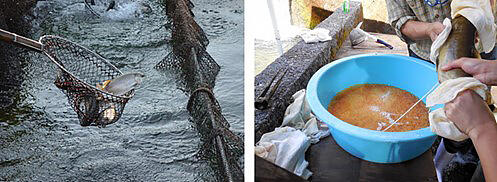
(Provided by Smolt, Inc.)
Mr. Ueno became completely absorbed in masu salmon aquaculture, and eventually started thinking about founding his own company. "Breeding for aquaculture in seawater and collaboration with producers were both advancing. But to move to the next phase, to go from a research base to industry, we needed people to take the lead. I thought, this could be a chance for me, too. I want to try it."
We talked with Professor Uchida about it, who spoke about his thoughts at the time. "I thought it was a really good thing. I had been doing my best to create a structure for production, but the complete structure wasn't immediately accepted by the region. Additionally, as researchers, we were thankful that we would be able to tackle any issues arising during the production process through both the university and a company."
In April 2019, Smolt, Inc. was set up with Mr. Ueno as its president. The Smolt company name is derived from 'smoltification.' This was the first student venture company from the University of Miyazaki.
Highly regarded for fish egg production and global warming countermeasures
At first, Mr. Ueno's own interests were stronger than any regional issues, but as he met with many different people, his determination to solve local problems through his business increased. "In Gokase, the population is aging and facilities are too. There were a lot of spaces for aquaculture that were no longer used. On top of this, people in Nobeoka were raising Japanese amberjack and greater amberjack, and this led to the issue of the fish cages used for this being empty in the winter. Masu salmon aquaculture is connected to solving this issue."
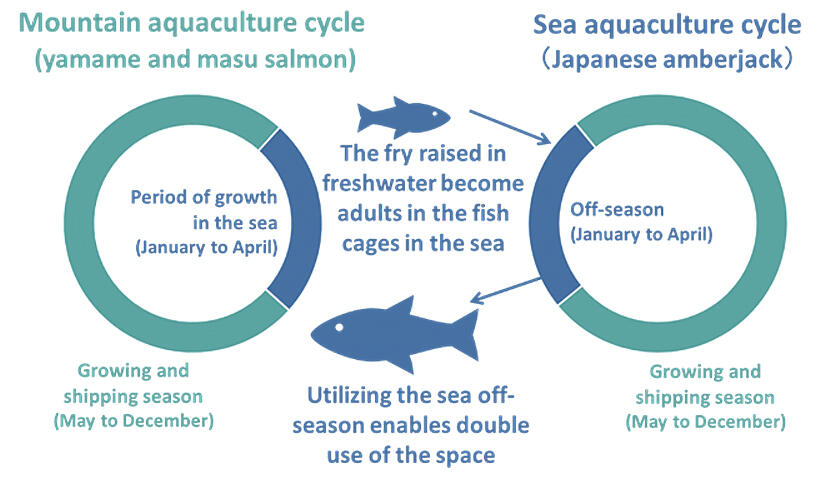
(This illustration was created by the Science Portal Editorial Office based on materials provided by Smolt, Inc. and modified by Science Japan)
Then, in October 2021, Smolt's "development of a breed in response to global warming through cyclical masu salmon farming and the sustainable production of roe" was selected for JST's STI for SDGs Award: JST President Award. This was two and half years after the company was formed.
"I think there are two key points regarding the award," said Mr. Ueno. The first is that Smolt isn't just producing fish meat through aquaculture; it is also producing fish eggs. "If it's just fish aquaculture you're looking for, you can find that anywhere. But Smolt alone is also involved in fish egg production," Mr. Ueno explained. Its new brand "Tsukimi Ikura" roe are collected from masu salmon that have been artificially reared over around two years, so the company can obtain large amounts of eggs in a sustainable manner through the production cycle.
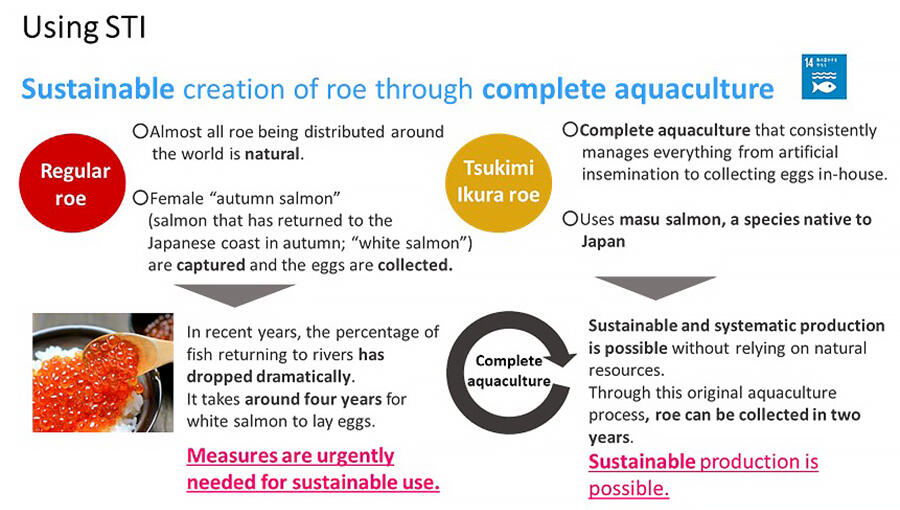
(Provided by Smolt, Inc.)
The second point is that Smolt's breeding technique responds to global warming. Chum and masu salmon are naturally vulnerable to high temperatures, and so they struggle in the summer, even on the Tohoku region's Pacific coast. "This is an issue we're seeing across the country, and we've got a salmon aquaculture bottleneck" (Mr. Ueno). Gokase, which is subject to severe cooling, is naturally a harsh environment for chum and masu salmon, but so is the warm sea off Nobeoka. However, it is thanks to this that they can rear breeds that are resistant to high-temperature waters. It can be said that this is a business that is taking advantage of the region's characteristics.
"As we have continued raising and breeding masu salmon in Miyazaki, almost all the fish have been able to adapt to the seawater. Our fish should have better resistance to higher water temperatures compared to the chum and masu salmon of Hokkaido and the Tohoku region, so I think our breeding here will become the groundwork for creating breeds that are resistant to global warming" (Professor Uchida).
Considering things from the perspective of consumers
Although the problem-solving process received high praise, Smolt's products must continue to generate profits for sustainable growth.
Mr. Ueno is focusing his efforts on considering things from the perspective of consumers. "I think the discrepancy between the research side and consumer awareness is one of the sticking points of venture companies that originate in universities. I've asked Professor Uchida to handle the research, and I'm prioritizing how the fish will be eaten," said Mr. Ueno, who has devoted himself to gathering information from users and making the best use of this in corporate management. 'The company's corporate website introduces masu salmon fillets that have been wrapped in cherry leaves, making good use of the skills of a sushi chef, and sparkling gold Tsukimi Ikura roe. The site is also frequently updated with media appearances and other news. Mr. Ueno is using his funds and efforts for such communications because he is strongly aware of the impression they will give consumers.
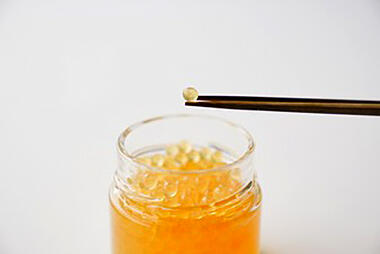
Professor Uchida praised Mr. Ueno for this: "He's really doing a good job. He's considering things from the perspective of consumers and he's also giving me the information he's obtained. I can't use it all, but a lot of it can be utilized for breeding."
Mr. Ueno said this about their policies for the future: "Rather than just raising and selling fish, I'm running a business with a clear focus on the future. I think it will be important to use 2030 as a cut-off point and look at how we're doing then." Mr. Ueno is looking for partners to collaborate with his research, production and sales to accomplish this, and is attempting to expand the business by drawing in more people. "Now, there's a tendency for people living in regional areas to be isolated, and I think there are a lot of places by the sea and in the mountains that are scraping by with just family management. But since 'our aquaculture is possible with just a location and know-how, we at Smolt, Inc. will connect these people, build partnerships, as mentioned in the SDGs, and engage in production and sales together." His efforts to create such a system have spread outside of Miyazaki Prefecture to Oita Prefecture, and in the future he wants to develop this further, across the whole country.
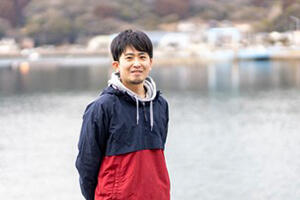
UENO Ken
Representative Director and CEO of Smolt, Inc. Graduated from the Faculty of Agriculture University of Miyazaki in 2018, and from the Graduate School of Agriculture of the same university in 2021. While attending the university, he became absorbed in the cultivation of masu salmon and started a business in 2019 while attending graduate school.
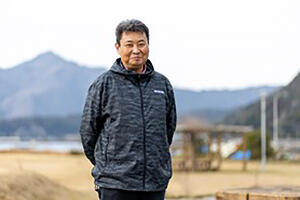
UCHIDA Katsuhisa
Professor, Faculty of Agriculture University of Miyazaki, Director of Smolt, Inc. Completed a doctoral course at the Graduate School of Science, the University of Tokyo in 1997. Researched salmon migration and environmental adaptation while attending the graduate school. After working at the University of Hawaii, RIKEN, and Niigata University, he became an associate professor at Miyazaki University and has been in his current position since 2016.
Original article was provided by the Science Portal and has been translated by Science Japan.




